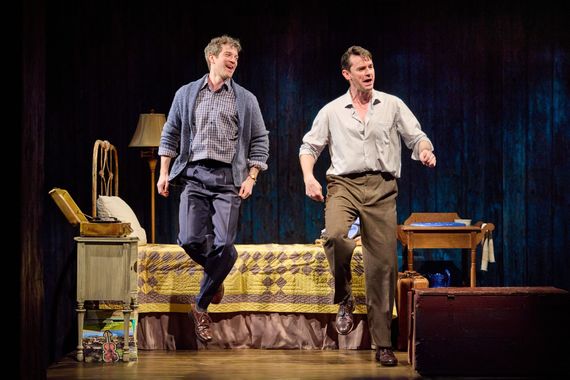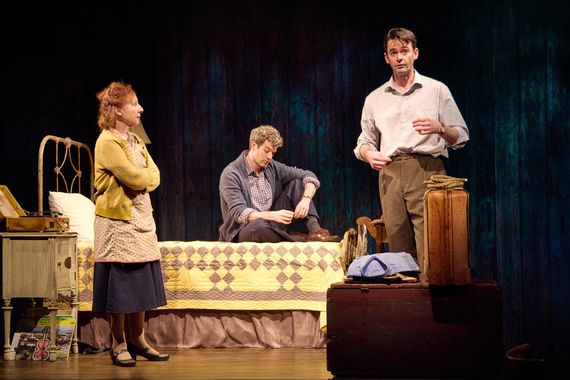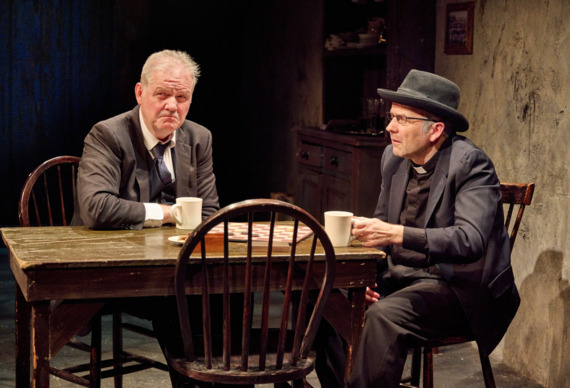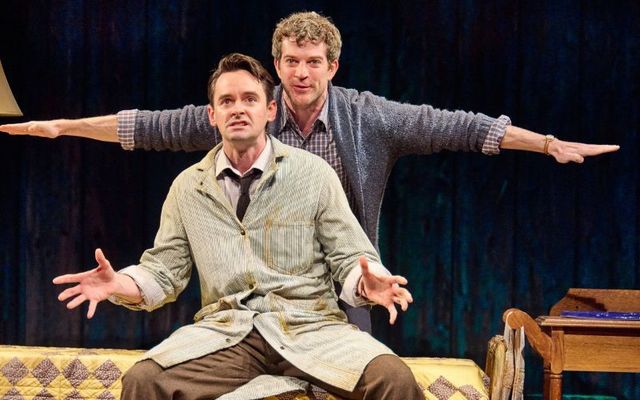In the time it takes to close the cabin doors on an Aer Lingus flight, it all starts to vanish: your presence on the island of your birth, your story there, the opportunities that will be soon lost to you, the connections you'll never make, the love you might have found – and the loves you’ll miss.
Given the scale of the theft, your heart can be curiously light as the plane accelerates toward take off. So it is for 25-year-old Gar O’Donnell in the Irish Repertory Theatre's moving new production of Brian Friel's breakthrough play "Philadelphia, Here I Come!"
It's the night before his move to Philadelphia and the momentousness of what he's doing is finally striking him.
This being an Irish American-led company, both director and actors bring an immigrant's rich awareness of the attractions and hauntings of an early-in-life departure from the land of your birth.

Some reviews have already referred to "Philadelphia," the latest in the Rep's celebration of Friel's achievements as an early work, but that is to miss the sophistication under the hood of this on-the-surface classic Irish emigrant's tale.
Friel isn't as interested in the sentiments of what's happening as he is in what it reveals about the characters and the larger society that are caught up in it. Brilliantly, he dramatizes the conflicting impulses of his central character by dividing up his public and private selves on stage, which are then played by two actors.
The result takes a fairly by-the-numbers Irish wake drama and turns it into something richer and stranger than the sum of its parts. What we see versus what is happening under the surface become the biggest tension of this already tense drama.
M. Florian Stabb's evocative sound design is another character in the play, bringing the birdsong of Co Donegal into the theatre before the lights go down and setting the scene. It's a small but true atmospheric evocation of what's to come.

When the lights go down, Terry Donnelly appears as Aunt Madge (one of the most tenderly observed of all of Friel's characters) the aunt who never married but who nevertheless finds herself looking after a house full of stoic men.
She's the heart of this broken family but she hardly knows it and Friel repeatedly shows us how her tender regard for others is scarcely returned in a series of gentle set pieces that break the heart. Donnelly knows how to mine the feeling but avoid the sentiment in a performance that is as real and lived as it is moving.
Next onstage is Gar Public, the character other actors see, played with by David McElwee.
Trailing him soon is Gar Private, his inner voice and id, played with often caustic brio by the all-electric A.J. Shively.
But curiously, it's the secondary characters who most resonated for me in this production. Ciaran O'Reilly plays Gar's monosyllabic father, S. B. O'Donnell, a man clearly in his last act and who moves and acts like he knows it. The weight of a literally unspeakable loss follows his footsteps and seems to make the gravity around him harder to move through or navigate.
Breaking through the protective shell of the shellshocked is the play's central struggle. Will the fact that Gar's leaving, possibly for good, inspire the father or son to unpack their long silent hearts to one another before the night falls and break the curse of involuntary solitude that is spoiling their lives?

Along the way, we meet Gar's gorgeous paramour, Kate Doogan, daughter of a Senator and impossibly out of his social reach. Played with gimlet-eyed pragmatism by Clare O'Malley, she's as attentive to her bank balance as she is to her heart and she's one more of the many reasons that Gar has accepted his plane ticket to the States.
Ciaran Byrne plays Kate's overprotective father to condescending perfection and matches this church and state double act by also playing the nights only religious figure Canon O'Byrne, a figurehead Gar finds especially odious for his failure to translate “all this groping, all this dreadful bloody buffoonery...into something human.”
A word too for Deirdre Madigan's luminous turn as Aunt Lizzy, the gauche Irish American in the flashy outfit who – in her vulgarity and quiet desperation - is a panel of Gar's possible future. Madigan mouths the word “desist” like it's an amulet her character employs against the fear of being unremarkable.
Watching this especially clear eyed production, which finds more pathos than humor as the night unfolds, I was reminded that Philadelphia is a kind of Rosetta Stone of Friel's entire oeuvre. It's all here, the failure to translate or connect, to our past and future, to each other, to the best version of ourselves or the people we actually love – and the human cost and consequences of that. Don't miss it.




Comments